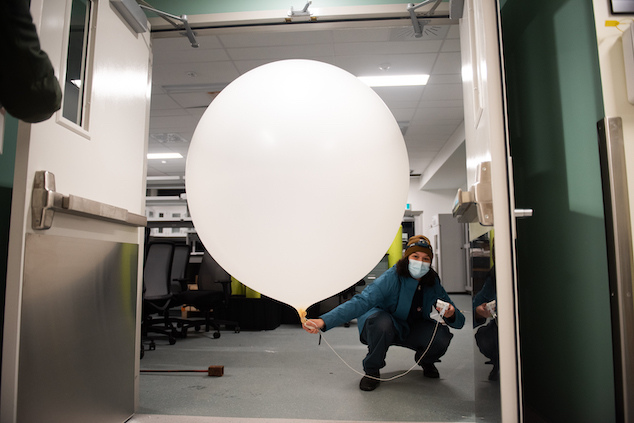New research pavilion will advance understanding of extreme weather events and ecosystem effects
The new Adaptable Earth Observation System (AEOS) research facility at the Gault Nature Reserve in Mont-Saint-Hilaire is open for business for those conducting cutting-edge research on extreme weather conditions. It also serves as a lab for advanced ecological research. Thanks to a Canada Foundation for Innovation (CFI) grant, this new pavilion paves the way to advancing environmental research by linking the Gault Nature Reserve with the project’s research stations in the Saint-Lawrence Valley, and in different parts of the world.
The new Earth Observation System (EOS) Laboratory, consisting of biology and atmospheric science laboratories, is designed to synthesize research of the two disciplines to provide continuous, real-time observations of the Saint Lawrence River valley’s (SLRV’s) earth system, thereby boosting the Gault Nature Reserve’s research capabilities.
 Weather balloon. Credit: Alex Tran / McGill University
Weather balloon. Credit: Alex Tran / McGill University
Those spearheading research at the new EOS Laboratory, including Department of Atmospheric and Oceanic Sciences Professors John Gyakum, Frédéric Fabry, Daniel Kirshbaum, and Yi Huang, are studying weather systems in the Saint Lawrence River Valley. Professor Hans Larsson and colleagues in the Biology Department, Melania Cristescu, Gregor Fussman, Andrew Gonzalez, and Irene Gregory-Eves, are also studying the effects of weather and climate on living organisms. The AEOS will also facilitate analyses and studies of water, soil, and biological samples. Combined with a range of meteorological instrumentation, drones, and mobile laboratories, the EOS Laboratory will serve as a centre for the acquisition, processing, and analysis of data on site.
Some research is already underway. For six weeks in February and March, researchers from McGill were involved in a large-scale North American study which spanned the St. Lawrence River Valley and included researchers from the Université du Québec à Montréal, the University at Albany, the University of Wyoming, the University of Colorado and the National Research Council. They collected data during extreme weather conditions to better understand the transitions between winter precipitation types, such as freezing rain and snow. This research is also expected to facilitate improvement in weather predictions of winter precipitation types.
About McGill University
Founded in Montreal, Quebec, in 1821, McGill University is Canada’s top ranked medical doctoral university. McGill is consistently ranked as one of the top universities, both nationally and internationally. It is a world-renowned institution of higher learning with research activities spanning three campuses, 11 faculties, 13 professional schools, 300 programs of study and over 39,000 students, including more than 10,400 graduate students. McGill attracts students from over 150 countries around the world, its 12,000 international students making up 30% of the student body. Over half of McGill students claim a first language other than English, including approximately 20% of our students who say French is their mother tongue.



